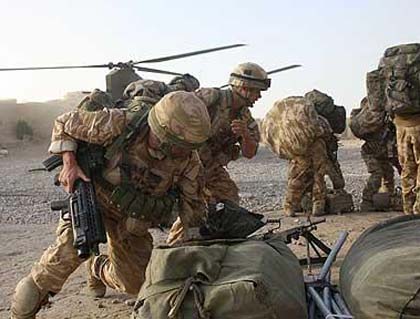Taliban militants continue to jib at playing ball with Karzai government in the presence of inter national forces, whom they regard as occupiers. But the militants have shown a contradiction in their statements and behaviors as they have also said that they would not talk with what they call as Karzai's puppet government. In the meanwhile, reports show that Taliban representatives have had several rounds of talks with the US in Germany and some other countries. The government and international community seem to be losing ground in fighting Taliban.
This is because international forces and Afghan government had a very lax approach towards this stubborn enemy for the last four years. The argument advanced by analysts is that negotiations should not be accompanied by an easing of military pressure. President Karzai has had international muscle behind to pursue peace talks with the Taliban. He has time and again unilaterally plucked up his courage and asked Mullah Omar and Hekmatyar's address to contact and ask them not to kill the people and not to destroy the country, which deserves development, construction and progress. But unfortunately, this process has not got off the ground as the country continues to witness deadliest suicide and terrorist attacks carried out by the Taliban into the capital and in provinces.
Taliban are more articulate in their conditions for peace talks then the government and international community as though they feel to have the upper hand. Once the Taliban spokesman said, "We have pre-conditions. As long as Afghanistan is not recognized as an independent country and its reputation is not restored, we cannot negotiate or deal with anyone on our homeland. We cannot sit at negotiation table with foreigners or Kabul government until then. Calls by Kabul government and its foreign allies for negotiation, in reality, are not call for negotiation and talks; it is (rather) call for surrender. They say that Taliban should accept Afghan constitution, which is written under foreign dominance, lay down their weapons, and then we will negotiate. This means call for submission."
The general situation in Afghanistan not only is not fully stable but also is deteriorating, reflecting a fluid political and military environment. Afghan government has failed in its attempt to assert control over the country characterized by over two decades of war, natural disaster and instability. In the constellation of political structures of Afghanistan, the Taliban are emerging as prominent corporate entity. President Karzai's offer of peace talks to Taliban by calling them as upset and unhappy brothers could not have any taming impact on the harsh clique. In fact, the Taliban nurse blood feud against the government for allowing international forces. The psychology of the Taliban is not ready for this process.
In the beginning, following the collapse of Taliban regime in 2001, the Taliban appeared to be defeated and were in trouble but now they attempt to display a high profile presence politically and militarily. It is a very difficult process for the government as well, for it enters into dialogue with the actors that have killed innocent school children, burned schools slaughtered journalists, engineers and traumatized as many families. They still continue to do these terrible things.
In latest incidents, President Karzai's top adviser, Jan Mohammad Khan, killed at his home along with MP from Uruzgan province, president Karzai's brother and head of provincial council of Kandahar province was also killed. The militants claimed that Ahmad Wali Karzai's bodyguard, who changed to become his murderer, was cooperating with him for years. On Thursday, July 14, 2011, Maulvi Hikmatullah Hikmat, the head of Kandahar Ulema Council, was killed in a suicide blast in Kandahar as well.
As these incidents continue to claim Afghan lives, disrupt their daily lives and hamper progress and reconstruction, international forces are leaving the country giving rise the concern that Afghanistan will be plunged into a new round of chaotic period because the country is not stable enough to keep the order after the withdrawal of foreign forces.
On Friday, July 15, 2011, the U.S. military confirmed that around 650 US army troops deployed in the central province of Parwan, north-west of Kabul, flew out on Wednesday to kick off the scheduled drawdown. US President Barack Obama in June announced that 33,000 American troops would leave Afghanistan by the end of next summer, leaving behind 65,000 and effectively ending a military ordered into the country late 2009. Canada has already withdrawn its forces from Afghanistan. Many other countries that have troops deployed and operating in Afghanistan to help stabilize the country have begun or are going to begin to pull out their forces from the country.
French President Nicolas Sarkozy, during his visit to Afghanistan said that his country would pull troops from Afghanistan gradually, with the first phase of withdrawal concluding before the end of 2012. The security transition process is slated to start this month and complete by 2014. French president also said his country would continue to assist Afghanistan in many fields beyond 2014, when the withdrawal of foreign troops would be complete. But these pronounced pledges and commitments to Afghanistan for the long run cannot allay the concerns of Afghan people.
The ramshackle economy is beginning to shake before even it is stabilized. Taliban militants have infiltrated among the closed security guards.
An unstable Afghanistan that continues to be prone to falling back to the hands of hard-line and extremist militants linked and allied with regional and global terrorists will pose threats to world security. It is true that terrorism in Afghanistan has mainly external root but it is Afghanistan that continues to remain the theater of bloodshed, murder, roadside bombings, suicide and terrorists attacks and the appalling acts of kidnapping. In all of these horrifying incidents, it is the Afghan people that fall victims and suffer.

